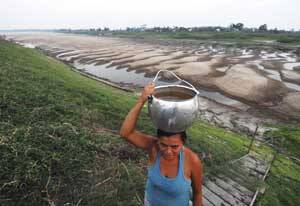World leaders participating in this month’s U.N. Climate Change Conference must remember that the world’s poorest and most vulnerable people will suffer the most from serious climate shifts, church activists say. “This is a pivotal point for all people of faith and good will,” said Cliona Sharkey, policy and advocacy officer for Cidse, an international network of Catholic development agencies. “We simply cannot accept the continuation of a situation that is [most affecting] the people who have contributed least to the problem.”
Church groups called for negotiators, scheduled to meet in Copenhagen, Denmark, from Dec. 7 to 18, to sign a legally binding agreement that includes sharp cuts in greenhouse gas emissions by industrialized countries and offers long-term funding to help developing countries adapt to the effects of climate change. Climate activists say that to slow climate change, industrialized countries must reduce emissions of greenhouse gases—carbon dioxide, methane and nitrous oxide—by 40 percent to 45 percent from 1990 levels. There is cause for hope that a meaningful resolution could emerge from Copenhagen. Brazil, a developing country whose economy and energy needs have grown rapidly in recent years, has expressed willingness to cut emissions by 38 percent from 1990 levels. President Barack Obama offered to reduce greenhouse gas emissions by 17 percent from 2005 levels, a substantially higher commitment than the 1990 benchmark. That pledge was matched by Chinese officials, who offered a cut of 40 percent to 45 percent from 2005 levels, with the possibility of further reductions if the United States agreed to do more.
Global warming could affect food and water supplies, public health, infrastructure and political security, according to Sharkey. “It’s all interrelated,” she said. “The implications are felt first by people living in poverty, but those implications will filter up with huge, devastating impacts for everybody if it’s not controlled now, when we have the chance.”
Island nations and countries with coastal cities are threatened by rising sea levels, while mountain farmers who depend on glacial runoff in dry seasons are seeing glaciers disappear. Other regions, including northeastern Brazil and parts of Africa, are suffering increased drought.
“Kenya has experienced three successive rainy season failures, which has affected food security,” said Janet Mang’era, national executive secretary of Caritas Kenya, the Kenyan bishops’ development and social services agency.
African countries also are suffering from decreasing water supplies, which affect hydroelectricity, drinking water, tourism, irrigation for crops and water for livestock, Mang’era said. There has been a “rise in resource-based conflicts among pastoral communities in northern Kenya and also between wildlife and humans,” she said, and people are being forced to migrate from rural areas to cities as deserts encroach on crop land. Climate changes have severely affected food production, she said, exacerbating poverty, particularly among women, who form the majority of the poor and a large proportion of the subsistence farmers in Africa.
In recent years, wealthy countries have pledged funds to help poor countries adapt to climate change. The money also was to be used to help vulnerable countries prepare for disasters such as drought or flooding from storms. But most of the promised funds have not reached the countries with the greatest need.
If radical steps are not taken in Copenhagen, Sharkey fears that the world’s developing countries—whose emissions will also increase in the future—could be heading down a path toward unsustainable development. “What is necessary is a fundamental shift in our models of development,” she said. “Climate change is exacerbating and increasing poverty and inequality. The more we delay taking effective action, the greater the impacts of climate change are going to be.”








